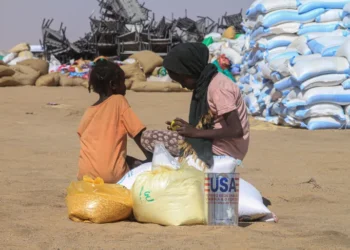Holding a press conference to kick off week two of COP28, Sultan Al Jaber, the COP28 President, asserted the UN climate summit under his leadership is better and more successful than previous summits.
This came as delegates returned to negotiations on Friday, December 8, 2023, after having Thursday as a rest day.
“We can all agree COP28 has been different, and I am sure we will agree that COP28 has already made history,” he said.
Al Jaber stressed, “There is a unique sense of momentum, a sense of inclusivity and a sense of willingness and flexibility.”
“I also feel a sense that something unprecedented is possible to happen here at COP28,” he noted.
“We achieved consensus on the first day with the loss and damage and I believe with the momentum we have, with the action-oriented mindset that has been instilled across the board here on the site, I believe we can achieve consensus again on the rest of the agenda.”
Sultan Al Jaber
When asked how he would bring those countries “reluctant on the issue of fossil fuels” including China, Russia and Saudi Arabia, on board, he answered, “I have been engaging with everyone on all parties” and said this includes “businesses and industry.”
He added, “I did not leave any stone unturned for my commitment for the highest possible ambition ever coming out of a COP.”
Commenting financing for developing countries to combat climate change, the COP28 President remarked, “We cannot only view climate change as a burden, a problem or a challenge. We have to turn that narrative and claim it as an opportunity – it can be seen as a new industrial revolution.”
“Finance must be made available, accessible and affordable not only by making pledges but by ensuring that the mechanisms that will allow for those who need it are easy for them to tap into and ensure the delivery of this money on a timely basis.”
Sultan al Jaber
Livestock Emissions Affecting Climate

In other developments, research published on Friday by the Food and Agricultural Organisation (FAO) at COP28 revealed the huge impact of livestock emissions on the climate.
Livestock produce methane, a greenhouse gas 80 times more powerful than carbon dioxide, making them a key contributor to the climate crisis.
The FAO found that livestock agrifood systems, which include cattle, buffaloes, sheep, goats, pigs and chickens, are responsible for 6.2 gigatonnes (Gt) of carbon dioxide equivalent (CO2eq) emissions.
This accounts for approximately 12% of all emissions in 2015, the baseline year chosen for the study.
It also found that of all the six animal species considered, cattle contribute to more than 60% of global livestock emissions.
It added that two-thirds of the emissions are linked to meat production across all species
Without intervention, this upward trend could result in increased emissions from livestock systems, potentially undermining efforts to reduce Greenhouse gas emissions and exacerbating global temperature rises.
The FAO concluded that more sustainable practices are needed, including breeding livestock for lower emissions and changing their feed, as well as changing human diets.
Meanwhile, Ivo Vlaev, a Professor of behavioural science at Warwick Business School at the University of Warwick, opined that shifting public dietary habits, especially in affluent countries where meat consumption is high, is a complex challenge.
“People’s food choices are deeply ingrained and influenced by cultural, social, and personal factors,” he said.
The Professor suggested, “Interventions to change these behaviours must account for these influences, potentially employing strategies like social norming (highlighting the growing popularity of plant-based diets), framing (emphasising the personal health benefits of reduced meat consumption), and facilitating ease of access to alternative protein sources.”






















